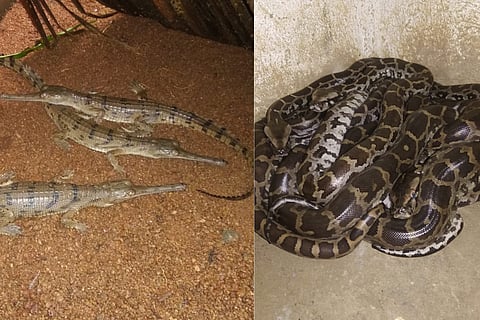

The Chennai Snake Park, which is credited with being the first reptile park in India, has been severely affected by the pandemic. The iconic park in Chennai now has just enough funds to scrape through two more months, its Director M Rajarathinam told TNM. The Chennai Snake Park Trust, which manages the park, was forced to lay off 50% of its 22 staff members and majorly slashed the salaries of the remaining employees, in a bid to stay afloat during the pandemic. Most of the park’s reserve funds have been used up to feed the 38 species of reptiles housed there, including 23 snakes, according to the director.
For 11 months now, the Chennai Snake Park, situated inside the Guindy National Park in Chennai’s Adyar, has remained closed to visitors. This has starved the park of visitors’ fees, which is its major source of income. “We only charge Rs 20 per adult and Rs 10 per child. But the park has been so popular that we used to make Rs 6-7 lakh a month just from visitors. But since 2020, things have gone south when we closed our doors in March,” Rajarathinam explained. The park reopened to visitors from November 2020 to April 2021, until the second wave of the set in. However the visitor footfall was abysmally low in this period, Rajaratinam said.
Out of the Rs 6-7 lakh that the Chennai Snake Park Trust made on a monthly basis, Rs 2 lakh went toward reptile feed, and Rs 4 lakh went toward staff salaries. With the pandemic, this source of income dried up entirely. When the park briefly opened up between November 2020 and April 2021, it only made only Rs 3-3.5 lakh a month, which was just enough to maintain the reptiles.
What was once a wildlife centre which has educated generations in the city about reptiles, the park now operates with a skeletal workforce, who have sacrificed a major chunk of its salary to keep the institution running. “We had on our payroll two scientists for research, 12 animal keepers, four night watchmen, gatekeepers and others including clerks, a cashier and janitors,” Rajarathinam said. The institution wishes to retain all of their employees, if they receive funds.
While the snake park needs its visitors, in the quiet months of 2020 when the park stayed entirely shut to human beings, its Gangetic Gharials— a Schedule 1 protected species as per the Indian Wildlife Act— bred after several years. The park now has 20 Gangetic Gharial juveniles and five Indian python hatchlings. The pythons too bred after years, Dr SR Ganesh, Scientist and Deputy Director of the snake park told TNM.
Both the gharials and the pythons typically mate during the winter months of December and January. In two months, the female of the species is egg-bound and starts depositing the eggs. It takes two more months and a conducive atmosphere for the eggs to fully develop and hatch, Dr Ganesh explained.
“The Gharial is an extremely threatened species and in all these years of the park (which was founded in 1972), we have not seen the gharials mate. But in 2020, the gharials mated. Although it is just a hypothesis right now, we are studying if the mating was made possible due to the lack of human interference,” he said. Dr Ganesh also explained that the babies are now the second or third generation gharials of the park.
The upkeep and feeding of the pythons and Gharials will cost the park more. “The Gharials— babies and adults— are only fed fresh water fish. As we don’t have the facility to breed our own fish, we buy human consumption grade fish from the market and feed our gharials. Every alternate day, we buy the feed from the market and feeding 20 gharials will cost a lot,” Dr Ganesh explained.
The park’s director Rajarathinam added, “We urgently need about Rs 6-7 lakh to continue running for the next few months. The amount will mainly cover the feed and maintenance of our reptiles and some staff salary.”
Following the first wave of COVID-19, the Chennai Snake Park received Rs 30 lakh in public donations. This was used up to survive 11 months of the pandemic. This year, the park’s directors have written to Tamil Nadu Chief Minister MK Stalin, asking for the state government’s financial assistance. They have also written to Tamil Nadu Governor Banwarilal Purohit regarding the same.
Formerly known as the Madras Snake Park Trust, this park was among two iconic institutions founded by popular herpetologist Romulus Whitaker, who is no longer associated with the park. The other institution is the Madras Crocodile Bank Trust, located near Mahabalipuram.
Both of these parks need funds to survive. You can make donations at the Chennai Snake Park and The Madras Crocodile Bank Trust websites.